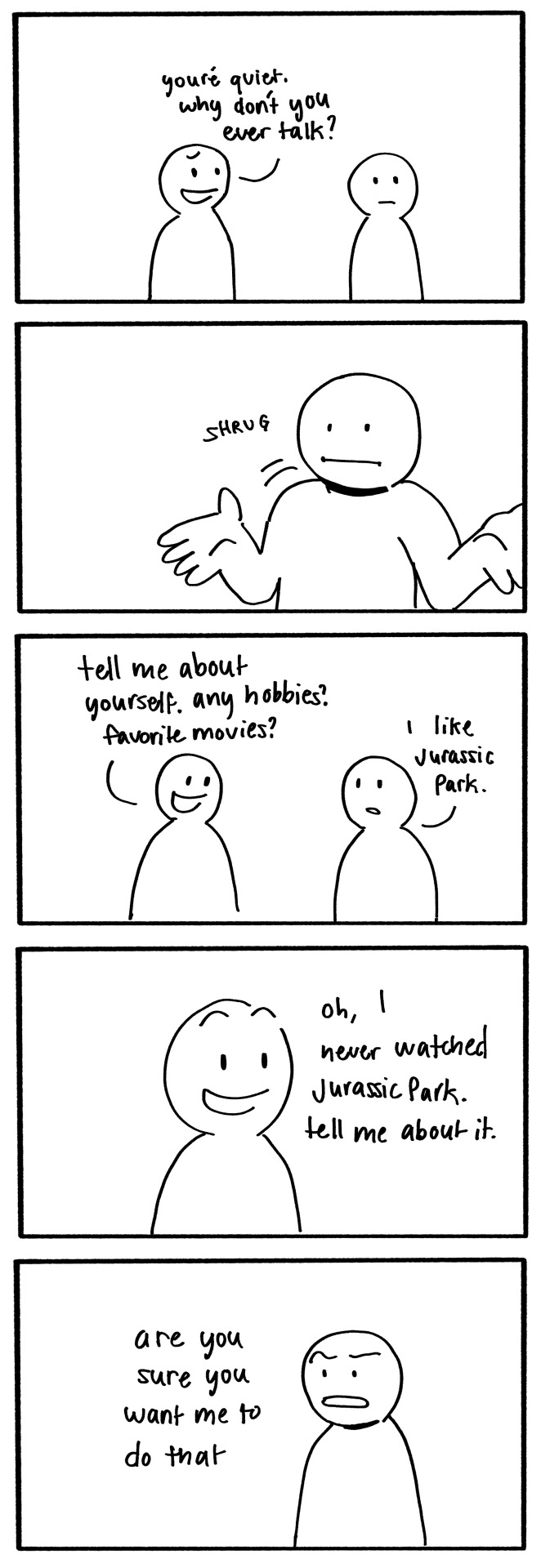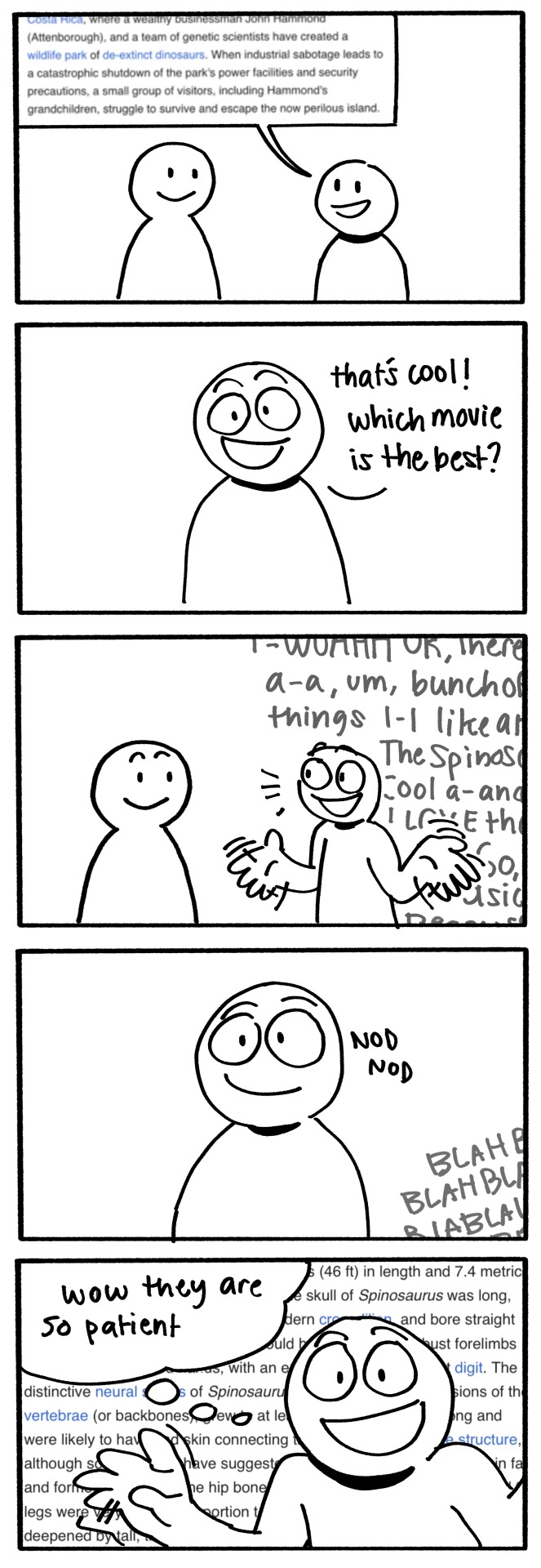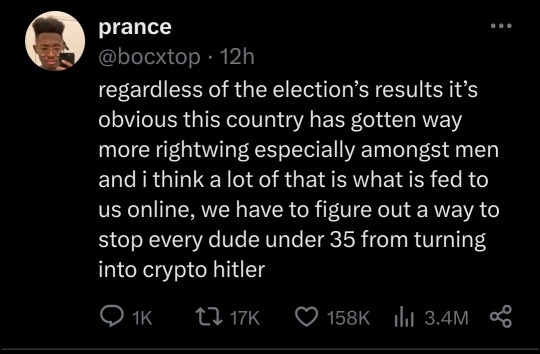Text
thinking about that post that's like "by providing a face-preserving way to admit the outgroup can be correct, that 'heartbreaking, the worst guy you know made a valid point' article has done more to rectify online discourse than any rationalist ever will"
9K notes
·
View notes
Text
reblog to diminish the horrors from the person you reblogged from
251K notes
·
View notes
Text
Rabbits Rabbits Rabbits
Reblog this on the first of the month for good luck all month long!
379K notes
·
View notes
Text
Experiencing catastrophizing anxiety can be like doomscrolling headlines your brain is writing in real time, and I like this metaphor because then when I notice I'm doing it I can tell myself to get a better editor and stop posting clickbait
151 notes
·
View notes
Text
as is tradition. jan richardson's "blessing for the longest night":
.
All throughout these months
as the shadows
have lengthened,
this blessing has been
gathering itself,
making ready,
preparing for
this night.
.
It has practiced
walking in the dark,
traveling with
its eyes closed,
feeling its way
by memory
by touch
by the pull of the moon
even as it wanes.
.
So believe me
when I tell you
this blessing will
reach you
even if you
have not light enough
to read it;
it will find you
even though you cannot
see it coming.
.
You will know
the moment of its
arriving
by your release
of the breath
you have held
so long;
a loosening
of the clenching
in your hands,
of the clutch
around your heart;
a thinning
of the darkness
that had drawn itself
around you.
.
This blessing
does not mean
to take the night away
but it knows
its hidden roads,
knows the resting spots
along the path,
knows what it means
to travel
in the company
of a friend.
.
So when
this blessing comes,
take its hand.
Get up.
Set out on the road
you cannot see.
.
This is the night
when you can trust
that any direction
you go,
you will be walking
toward the dawn.
451 notes
·
View notes
Text
northern hemisphere babes we made it to the longest night of the year. we made it. for the next 6 months, every day will give us a little more daylight than the last. let's go. take my hand. climb out of the darkness with me
169K notes
·
View notes
Text
The Insider and Outsider Detectives
So there's a lot of discourse about detectives floating around, ever since 2020 shifted a lot of people's Views on the police. Everyone likes a good mystery story, but no one seems to know what to make of a detective protagonist- especially if they're a cop. And everyone who cares about this kind of thing likes to argue over whether detective stories hold up the existing order or subvert it. Are they inherently copaganda? Are they subversive commentary on the uselessness of the police?
I think they can be both. And I think there's a framework we can use to look at individual detectives, and their stories, that illuminates the space between "a show like LAPD straight-up exists to make the cops look good" and "Boy Detective is a gender to me, actually".
So. You can sort most detectives in fiction into two boxes, based on their role in society: the Insider Detective and the Outsider Detective.
The Insider Detective is a part of the society they're investigating in, and has access to at least some of the levers of power in that society. They can throw money at their problems, or call in reinforcements, and if they contact the authorities, those authorities will take them seriously. Even the people they're investigating usually treat them with respect. They're a nice normal person in a nice normal world, thank you very much; they're not particularly eccentric. You could describe them as "sensible". And crime is a threat to that normal world. It's an intrusion that they have to fight off. An Insider Detective solving a crime is restoring the way things ought to be.
Some clear-cut examples of Insider Detectives are the Hardy Boys (and their father Fenton), Soichiro "Light's Dad" Yagami, or Father Brown. Many police procedural detectives are Insider Detectives, though not all.
The Outsider Detective, in contrast, is not a part of the society they're investigating in. They're often a marginalized person- they're neurodivergent, or elderly, or foreign, or a woman in a historical setting, or a child. They don't have access to any of the levers of power in their world- the authorities may not believe them (and might harass them), the people they're investigating think they're a joke (and can often wave them off), and they're unlikely to have access to things like "a forensics lab". The Outsider Detective is not respectable, and not welcome here- and yet they persist and solve the crime anyway. A lot of the time, when an Outsider Detective solves a crime, it's less "restoring the world to its rightful state" and more "exposing the rot in the normal world, and forcing it to change."
Some clear-cut examples of Outsider Detectives are Dirk Gently, Philip Marlowe, Sammy Keyes, or Mello from Death Note.
Now, here's the catch: these aren't immutable categories, and they are almost never clear-cut. The same detective can be an Insider Detective in one setting and an Outsider Detective in another. A good writer will know this, and will balance the two to say something about power and society.
Tumblr's second-favourite detective Benoit Blanc is a great example of this. Theoretically, Mr. Blanc should be an Insider Detective- he's a world-famous detective, he collaborates with the police, he's odd but respectable. But because of the circumstances he's in- investigating the ultra-rich, who live in their own horrid little bubbles- he comes off as the Outsider Detective, exposing the rot and helping everyone get what they deserve. And that's deliberate. There is no world where a nice, slightly eccentric, mildly fruity, fairly privileged guy like Benoit Blanc should be an outsider. But the turbo-rich live in such an insular world, full of so much contempt for anyone who isn't Them, that even Benoit Blanc gets left out in the cold. It's a scathing political statement, if you think about it.
But even a writer who isn't trying to Say Something About The World will still often veer between making their detective an Insider Detective and an Outsider Detective, because you can tell different kinds of stories within those frameworks. Jessica Fletcher from Murder She Wrote is a really good example of this-- she's a respectable older lady, whose runaway success as a mystery novelist gives her access to some social cachet. Key word: some.
Within her hometown of Cabot Cove, Fletcher is an Insider Detective. She's good friends with the local sheriff, she's incredibly familiar with the town's social dynamics, she can call in a favour from basically anyone... but she's still a little old lady. The second she leaves town, she might run into someone who likes her books... but she's just as likely to run into a police officer who thinks she's crazy or a perp who thinks she's an easy target. She has the incredibly tenuous social power that belongs to a little old lady that everyone likes- and when that's gone, she's incredibly vulnerable.
This is also why a lot of Sherlock Holmes adaptations tend to be so... divisive. Holmes is all things to all people, and depending on which stories you choose to focus on, you can get a very different detective. If you focus on the stories where Holmes collaborates with the police, on the stories with that very special kind of Victorian racism, or the stories where Holmes is fighting Moriarty, you've got an Insider Detective. If you focus on the stories where Holmes is consulting for a Nice Young Lady, on the stories where Holmes' neurodivergence is most prominent, or on his addictions, you've got an Outsider Detective.
Finally, a lot of buddy detective stories have an Insider Detective and an Outsider Detective sharing the spotlight. Think Scully and Mulder, or Judy Hopps and Nick Wilde. This lets the writer play with both pieces of the thematic puzzle at the same time, without sacrificing the consistency of their detective's character.
Back to my original point: if you like detective fiction, you probably like one kind of story better than the other. I know I personally really prefer Outsider Detective Stories to Insider Detective Stories- and while I can enjoy a good Insider Detective (I'd argue that Brother Cadfael, my beloved, is one most of the time), I seek out detectives who don't quite fit into the world they live in more often than not.
And if that's the vibe you're looking for... you're not going to run into a lot of police stories. It's absolutely possible to make a story where a cop (or, even better, an FBI agent) is an Outsider Detective-- Nick Angel from Hot Fuzz was originally going to be one of my 'clear-cut examples' until I remembered that he is, in fact, legally a cop! But a cop who's an Outsider Detective is going to be spending a lot of time butting heads with local law enforcement, to the point where he doesn't particularly feel like one. He's probably going to get fired at some point, and even if his badge gets reinstated, he's going to struggle with his place in the world. And a lot of Outsider Detective stories where the detective is a cop or an FBI agent are intensely political, and not in a conservative way- they have Things To Say about small towns, clannishness, and the injustice that can happen when a Pillar Of The Community does something wrong and everyone looks the other way. (Think Twin Peaks or The Wicker Man.)
Does this mean Insider Detective Stories are Bad Copaganda and Outsider Detective Stories are Good Revolutionary Stories? No. If you take one thing away from this post, please make it that these categories are morally neutral. There are Outsider Detective stories about cops who are Outsiders because they really, really want an excuse to shoot people. There are Insider Detective stories about little old people who are trying to keep misapplied justice from hurting the kids in their community. Neither of these types of stories are good or bad on their own. They're different kinds of storytelling framework and they serve different purposes.
But, if you find yourself really gravitating to certain kinds of mysteries and really put off by other kinds, and you're trying to express why, this might be a framework that's useful for you. If your gender is Boy Detective, but you absolutely loathe cop stories? This might be why.
(PS: @anim-ttrpgs was posting about their game Eureka again, and that got me to make this post- thank them if you're happy to finally see it. Eureka is designed as an Outsider Detective simulator, and so the rules actively forbid you from playing as a cop- they're trying to make it so that you have limited resources and have to rely on your own competence. It's a fantastic looking game and I can't recommend it enough.)
(PPS: I'm probably going to come back to this once I finish Psycho-Pass with my partner, because they said I'd probably have Thoughts.)
(PPPS: Encyclopedia Brown is an Insider Detective, and that's why no one likes him. This is my most controversial detective take.)
3K notes
·
View notes
Text
it's cold out there, reblog to give a trans man a cup of soump

106K notes
·
View notes
Text
reblog to diminish the horrors from the person you reblogged from
251K notes
·
View notes
Text
The way the government treats homeless people and panhandlers ought to be evidence enough on its own that empathy doesn't always lead to ethical behavior. Middle and upper class people get uncomfortable seeing homeless people because seeing someone in a bad state triggers an uncomfortable empathic response. They feel bad seeing people suffering. But people respond by trying to remove the source of their discomfort just as often as they respond with compassion.
That's why cities respond with hostile architecture and brutality. They just need to make the problem invisible, and people stop complaining.
Empathy is very useful, but it's no substitute for actual ethical principles.
14K notes
·
View notes
Text
i think what most people fail to understand is that curating your online experience doesn't just mean blocking and filtering the things you don't like or don't want to see but that it also (and maybe more importantly) means engaging with the things you do like and want to see. if someone creates something that makes your experience better, let them know! tell them! reblog their things! you get to see/share more of what you like and they get to know that someone out there appreciates their work it's a win-win situation for everyone involved
22K notes
·
View notes
Text
Not that anybody asked, but I think it's important to understand how shame and guilt actually work before you try to use it for good.
It's a necessary emotion. There are reasons we have it. It makes everything so. much. worse. when you use it wrong.
Shame and guilt are DE-motivators. They are meant to stop behavior, not promote it. You cannot, ever, in any meaningful way, guilt someone into doing good. You can only shame them into not doing bad.
Let's say you're a parent and your kid is having issues.
Swearing in class? Shame could work. You want them to stop it. Keep it in proportion*, and it might help. *(KEEP IT IN PROPORTION!!!)
Not doing their homework? NO! STOP! NO NOT DO THAT! EVER! EVER! EVER! You want them to start to do their homework. Shaming them will have to opposite effect! You have demotivated them! They will double down on NOT doing it. Not because they are being oppositional, but because that's what shame does!
You can't guilt people into building better habits, being more successful, or getting more involved. That requires encouragement. You need to motivate for that stuff!
If you want it in a simple phrase:
You can shame someone out of being a bad person, but you can't shame them into being a good person.
104K notes
·
View notes
Text
Ok so my kid had an ear infection, right? As kids often do.
The doctor scraped out a bit of earwax to have a better look inside.
I was sent a bill for $200 PER EAR for this 5 second procedure which I did not give permission for them to do.
That was key- they did not ASK me if they could do this "procedure". And, as I OWN a medical practice (it's me. The medical practice is me, sitting in my house on video calls) I knew to call them when this bill came in to be like "You did not obtain informed consent for this procedure, and it was not en emergency procedure. You had full ability to gain my consent and didn't. I'm not paying."
And the massive hospital who owned the bill said "yuh-huh you do have to pay."
And I said "I own a practice. I know these laws. I do not owe you money for this."
And they conducted an "internal review" and SURPRISE! Decided I totally owed them money and they had never done anything wrong ever.
And so I called my state's Attorney General office, and explained the situation because, as I mentioned, I know the law. The AG got in touch within a couple days to say they were taking the case and would send the massive hospital conglomerate a knock it off, guys letter.
Lo and Behold, today I have a letter where said hospital graciously has agreed to forfeit the payment.
"How not to get screwed over by companies" should be part of civics class.
Know your rights and know who to call when they're infringed on. This whole process cost me $0 and honestly less effort than I would have expected.
May this knowledge find its way to someone else who can use it.
124K notes
·
View notes



